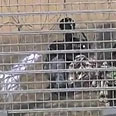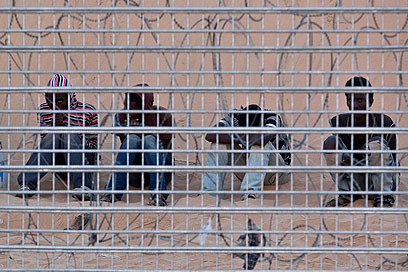
Israel allows entrance to 3 Eritrean migrants
Authorities allow in two women and boy, while placing remaining 18 asylum seekers who have been trapped near Israel's southern border in Egypt's custody
Israel has allowed entrance to two Eritrean women and a boy who were part of a group of asylum seekers who spent the past week trapped between the Israeli and Egyptian border fences. The remaining 18 male migrants have been placed in the custody of the Egyptian authorities.
"Everyone must understand that Israel is not a destination for infiltrators," Prime Minister Benjamin Netanyahu said, addressing the decision. "We are determined to stop the surge of infiltration… We will bolster the measures against those who employ illegal aliens, and will continue in the effort to deport the infiltrators."
Related stories:
- UN envoy urges Israel to let trapped migrants in
- Activists: IDF blocked food transfer to infiltrators
- Rights groups slam 'cruel' plan to detain Sudanese
The two women were sent to the Saharonim holding facility in the Negev.

Stuck until Sunday (Photo: Reuters)
MK Dov Khenin (Hadash), who arrived at the border to meet with the Eritreans but was turned away by the IDF, said he has asked for authorization to meet with them.
He noted that the border fence is not "a magic solution," emphasizing that it does not exempt Israel from reviewing migrants' asylum requests.
"This decision makes for cynical abandonment that might lead to the (migrants') death," MK Zahava Gal-On said of the measure. "The gesture that granted the two women and the teen humanitarian permission to enter Israel is not enough to cover up the State of Israel's wanton decision."
Attorney Yiftach Cohen, an activist with We are Refugees, a group that petitioned the High Court to allow the migrants into the Jewish state, accused the government of callously disregarding the judicial process.
"The Prime Minister's Office won't be able to cover up the fact that no one knows what happened to the 18 Eritreans who were sent back to Sinai," he said.
The group intends to motion the High Court to order the government to find out what happened to the migrants who were sent away.
'Israel has right to bar entrance'
The High Court mulled We Are Refugees' petition earlier on Thursday. The judges decided to hold another hearing on the matter on Sunday, and in the meantime ordered the State to devise an updated stance on the matter – creating the impression that the group would remain between the two borders until next week.
"Israel as a sovereign state has the right to decide who is allowed to come through its gates," was the State's earlier response the organization's petition.
As the High Court prepared to hear the petition, the IDF was once again preventing human rights activists from meeting with the Eritreans. Members of the Physicians for Human Rights - Israel organization were also prevented from meeting with the asylum seekers who have been camping out at the fence for days.
During the High Court hearing, judges asked whether the asylum seekers were on the actual border or within Israeli territory. A representative for the State said that the fence was a few meters within Israeli territory as "you cannot build a border fence within Egyptian territory."
We are Refugees activists have demanded to obligate Defense Minister Ehud Barak and Interior Minister Eli Yishai to allow the Eritreans into Israel and examine their request for international asylum. The petitioners asked for an urgent hearing and were granted one by Justice Esther Hayut.
Supreme Court President Justice Asher Grunis, Justice Neal Hendel and Justice Hanan Meltzer presided over the hearing. The Gaza Brigade commander was also present.
'Egypt responsible'
The State's response to the petition noted that: "On the humanitarian front, without taking away from the State's claims with regards to the (petitioner's) groundless claims on refugee laws, the military forces are working to provide the group with basic foodstuffs, water and should the need arise (and it is hoped that it will not) essential medical and humanitarian care as needed."In response to the petitioners' claim that Israel is obligated to open its doors to Eritreans based on the argument that Eritrean citizens are not sent back to their country… our stance is that the argument has no legal foundation."
The State argued that the basic assumption is that "Israel is a sovereign state and as such has the right to decide who is allowed to come through its gates. As such it is allowed to construct a fence separating it from Egypt."
The State's representative, Attorney Yochi Gensin argued that Egypt, which is also a signatory of the Refugee Convention, was the country responsible for absorbing the asylum seekers and examining their asylum status.
Attorney Omer Shatz, who represented the petitioners, said that the fence was efficient and allowed the State to examine whether asylum seekers are in fact just that or work migrants, but added: "To stick up a fence and say 'the legal status has changed' – we don't accept that. The fence is effective; there is a 90% drop in the number of infiltrators."
Shatz added that "If they (the asylum seekers) go back the Egyptian soldiers will shoot them or smugglers will rape them and sell their body parts."
The IDF spokesman said in response: "In accordance with directives from the political echelons and the Israeli government, IDF forces are working to prevent illegal entry to the territory of the State of Israel on the western border.
"Within the framework of this decision, the construction of a fence along the border is in its final stages of completion. Over the past few days on the western side of the fence, which faces Egypt, there is a group of infiltrators whose entry is being prevented thanks to the fence."
IDF forces have transferred food and water to the group through the fence.
Ynet correspondents contributed to the report
- Receive Ynetnews updates directly to your desktop










